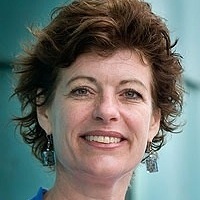
Mirjam de Bruijn
Mirjam de Bruijn is full professor of Contemporary History and Anthropology of Africa at the University of Leiden and senior researcher at the African Studies Centre in Leiden. Her work focuses on the interrelationship between agency, marginality, mobility, communication and technology. She was awarded a Vici grant for the research project ‘Connecting in Times of Duress: understanding communication and conflict in Middle Africa’s mobile margins’ (2012-2018) and developed Voice4Thought as a platform to bring the results of this project to the general public. De Bruijn works interdisciplinary, combining social anthropology, history, and development studies. She does fieldwork in Cameroon, Chad, and Mali, collaborates closely with African research institutes, and teaches in African studies, history, and anthropology. In addition, she has experience as scientific coordinator within CODESRIA’s Consortium for Development Partnership (CDP) and was the founding director of the research master African Studies at the University of Leiden.
Blog: mirjamdebruijn.wordpress.com
Research programme: www.connecting-in-times-of-duress.nl
Artistic-academic platform: www.voice4thought.org
Phone: 0031715278546
Address: Institute for history, Leiden University
PO Box 9515 RA Leiden, The Netherlands
&
Africa Studies centre
PO Box 9555, 2300 RB Leiden, The Netherlands
Blog: mirjamdebruijn.wordpress.com
Research programme: www.connecting-in-times-of-duress.nl
Artistic-academic platform: www.voice4thought.org
Phone: 0031715278546
Address: Institute for history, Leiden University
PO Box 9515 RA Leiden, The Netherlands
&
Africa Studies centre
PO Box 9555, 2300 RB Leiden, The Netherlands
less
InterestsView All (15)
Uploads
Papers by Mirjam de Bruijn
see also: https://scholarlypublications.universiteitleiden.nl/handle/1887/137626
This essay departs from my search to understand how (new/digital) media interact with society and vice versa, especially in relation to political communication and political change. These ‘effects’ of changing media technology, however, not only touch the societies that we try to understand but also our own practice of ‘doing’ research. Especially in area studies, the ethnographic method, the relations with the field, with people is at the center of ‘knowing’. Hence changes in these relationships, such as caused by (digital/new) Information and Communication Technologies (ICTs), will also influence the ‘data’ gathering, the insights, in short, the knowledge production processes and outcomes. In this essay I compare my own presence as a researcher in the Sahel in the 1990s and now, and I reinterpret this presence in relation to the changing communication ecology in the Sahel. My lens to analyze this is the concept of mediatization and mediation. It offers an interpretation of the changing relations in the field that has expanded with the use of digital media. Hence, I try to understand changes in knowledge ‘construction’ in ethnographic practice in the digital age.
see also: https://scholarlypublications.universiteitleiden.nl/handle/1887/137626
This essay departs from my search to understand how (new/digital) media interact with society and vice versa, especially in relation to political communication and political change. These ‘effects’ of changing media technology, however, not only touch the societies that we try to understand but also our own practice of ‘doing’ research. Especially in area studies, the ethnographic method, the relations with the field, with people is at the center of ‘knowing’. Hence changes in these relationships, such as caused by (digital/new) Information and Communication Technologies (ICTs), will also influence the ‘data’ gathering, the insights, in short, the knowledge production processes and outcomes. In this essay I compare my own presence as a researcher in the Sahel in the 1990s and now, and I reinterpret this presence in relation to the changing communication ecology in the Sahel. My lens to analyze this is the concept of mediatization and mediation. It offers an interpretation of the changing relations in the field that has expanded with the use of digital media. Hence, I try to understand changes in knowledge ‘construction’ in ethnographic practice in the digital age.